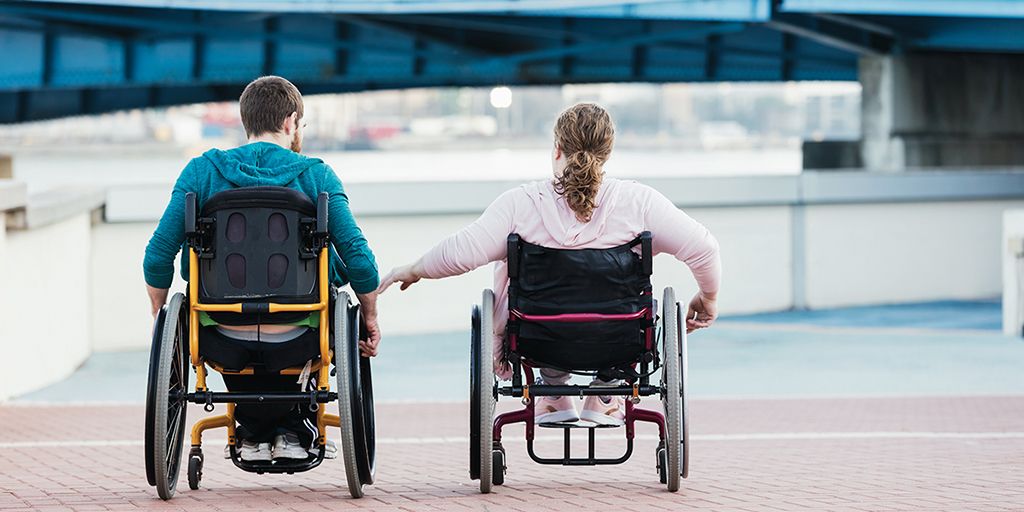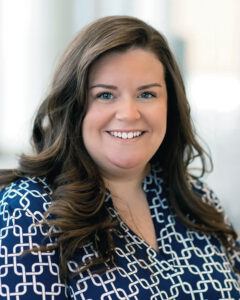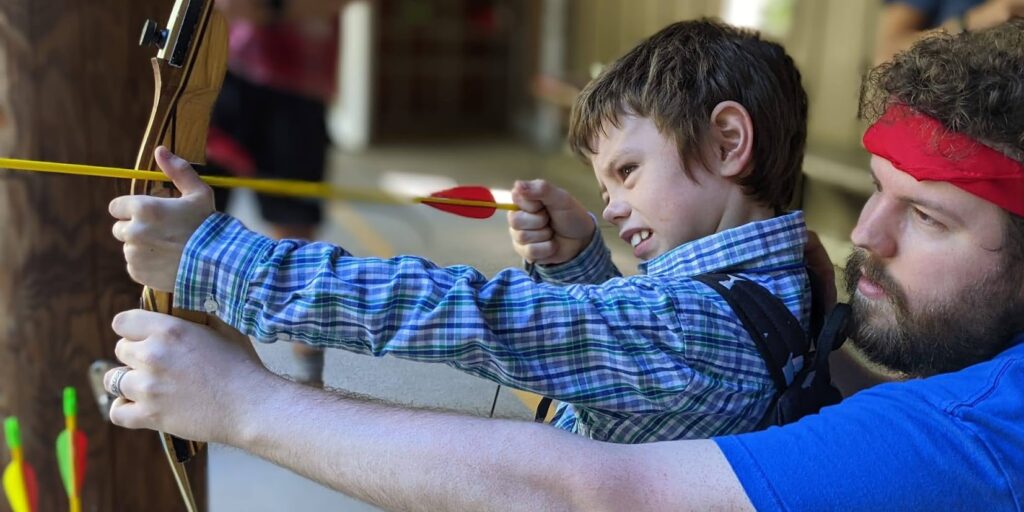
Positive Relationships
By Karen Doss Bowman | Wednesday, February 16, 2022
How adults with neuromuscular disease can form and nurture healthy romantic relationships
Trust. Honesty. Mutual respect. Affection. The key elements of a healthy romantic relationship are the same for all couples. When one or both partners have a disability, it can affect how they each approach daily tasks, but it doesn’t change the need for constant give-and-take.
For adults living with neuromuscular disease, building and nurturing positive intimate relationships may even be especially important, because there are unique dynamics due to physical limitations or the progressive nature of the disease. Fortunately, couples can rely on tried-and-true strategies for forming healthy relationships.
Foremost among those strategies is open and honest communication.

Briana Mills
“Share what you’re thinking or feeling with your partner; holding things in just creates resentment,” says Briana Mills, an associate marriage and family therapist living with SEPN1 muscular dystrophy in the Los Angeles area. “It’s important to talk about what you need and want. Also, have empathy for your partner and try to understand where they’re coming from.”
Setting and respecting boundaries helps establish the trust needed for open communication. That means valuing a partner’s identity and preferences while also supporting their needs. Having boundaries in place also can help establish roles and expectations.
“Understanding what defines a healthy relationship for you and your partner will help you work toward that — it may look different for any couple, including those living with neuromuscular disease,” says Sarah Stoney, MSW, LSW, a social worker at Children’s Hospital of Philadelphia.
A good start
Finding love is never easy. But navigating the world of dating and romance can be especially challenging for teenagers and adults living with disabilities — many of whom don’t start dating until their 20s.
“There is a prevailing stereotype that people who have a physical disability are not desirable. And whether directly or indirectly, most of us who are disabled get that message growing up,” says Briana.
The truth is, every person is capable of and deserving of love. Entering a relationship with that belief in mind helps establish it on a basis of mutual respect.
Danielle Sheypuk, PhD, a clinical psychologist living with spinal muscular atrophy (SMA) in New York City, says a good starting point is to cultivate one’s “dateable” self-esteem.

Danielle Sheypuk, PhD
“I can say that the key to successfully establishing a healthy relationship is to change your perception of yourself,” she says. “Cultivate your self-image as a person who is dateable, desirable, has a lot to offer a partner, and is capable of finding romantic love.”
This self-confidence helps a person not only stop defining themselves according to their relationship status, but once they do find someone, it helps them articulate what they want and need from their partner.
“It is important to remember that despite physical limitations, all individuals are entitled to a healthy sexuality and intimacy if that is what they desire,” Sarah says. “That’s why it is so important to talk about sexual health openly in order to destigmatize talking about sex and disabilities.”
Dual roles: partner and caregiver
For interabled couples — those in which one partner is disabled and the other is not — it is common for a romantic partner to also take on the role of caregiver.
Couples should find ways to balance the two roles. Talk about the frustrations and challenges of caregiving, but also make time for fun and intimacy — not just sex, but holding hands, hugging, and looking into each other’s eyes.
“Treat your partner lovingly, and keep the spark alive,” says Briana, whose boyfriend of six years is her caregiver.
Every couple has arguments, but they can lead to added tension when a significant other also is a caregiver. For example, what happens if a couple has a fight, and then the caregiver must help their partner to bed? Dr. Sheypuk recommends both people separating into different rooms and taking some time to calm down.
“When emotions are running hot, it’s difficult to think clearly and effectively,” Dr. Sheypuk says. “So separate and cool down — perhaps by meditating — and then reconvene to resolve the issue.”
Actively listening to each other and being willing to compromise can help partners resolve these situations and move forward.

Sarah Stoney, MSW, LSW
“In a healthy relationship, the caregiver would know and understand that their role as caregiver is obviously still needed despite an argument,” Sarah says. “Failure to do so could be seen as manipulative or abusive. If you are in an unhealthy relationship and your partner is your caregiver, then certainly enlisting the assistance of either professionals or close friends and family that you trust to develop a plan to ensure your safety is of utmost importance.”
Guarding against abuse
The Centers for Disease Control and Prevention (CDC) National Intimate Partner and Sexual Violence Survey found that about 1 in 4 women and nearly 1 in 10 men have experienced some type of abuse from an intimate partner. And, the CDC says, people with disabilities are at increased risk of experiencing these types of violence.
As a teen and young adult, Briana struggled with self-esteem, and in her early 20s she found herself in an abusive relationship with her first serious boyfriend. He was emotionally manipulative, going back and forth between professing his love and telling her he didn’t love her, and he demanded physical intimacy without considering what she wanted.
“I was very naive and didn’t know much about relationships,” Briana says. “I had no idea at first that what he was doing was abusive because he said he loved me. I thought that this must be what love is.”
Briana eventually got out of the relationship and today, as a therapist, she strives to help her clients with disabilities realize the value they bring to their relationships and empower them to recognize and escape abusive situations.
The most important way to safeguard against abuse is to know the warning signs. These can encompass a wide range of behaviors, including:
- Controlling behavior
- Name-calling or belittling
- Financial control
- Withholding medications or treatments
- Destroying medical equipment
- Inflicting physical harm
- Isolating the victim from their friends and family
These steps can help safeguard against an abusive relationship:
- Maintain a strong network of family and friends. Stay in touch with people who will look out for your best interests and would be willing to step in if you feel uncomfortable or afraid.
- Use technology to stay connected. Keep your primary communication device close by, such as your smartphone or iPad. If an abuser takes those away, think about alternative ways to communicate, such as using a voice-activated device, like Alexa, to call for help. A wearable device, like an Apple watch, also is a good idea.
- Seek help. Reach out to your healthcare provider, a mental health professional, or a support organization (see “Relationship Resources” below). Or talk to a friend or family member you trust. Don’t hesitate to call 911 if you feel that you’re in immediate danger.
Most important, Dr. Sheypuk adds, don’t settle for a relationship that feels uncomfortable or oppressive in some way. “It’s important not to feel trapped in a relationship,” she says. Trust your gut — if something doesn’t feel right, it probably isn’t.
“Sometimes people with disabilities feel like, ‘I need to stay in this relationship because I’ll never find someone else,’ or, ‘This is as good as it gets,'” Dr. Sheypuk says. “Nothing about these statements is true.”
A healthy relationship built on trust, respect, and affection should make you feel good about yourself and the person you’re with. “Your significant other should elevate you as a person and bring out the best of you,” Dr. Sheypuk says.
Karen Doss Bowman is a freelance writer and editor living with progressive muscular atrophy, a subset of ALS, in Bridgewater, Virginia.
Next Steps and Useful Resources
Relationship Resources
Use these resources to learn about recognizing unhealthy relationships and find support.
Centers for Disease Control and Prevention (CDC): Intimate Partner Violence
love is respect
866-331-9474
National Domestic Violence Hotline
800-799-SAFE (7233)
National Sexual Violence Resource Center
RAINN (Rape, Abuse & Incest National Network)
800-656-HOPE (4673)
Disclaimer: No content on this site should ever be used as a substitute for direct medical advice from your doctor or other qualified clinician.




